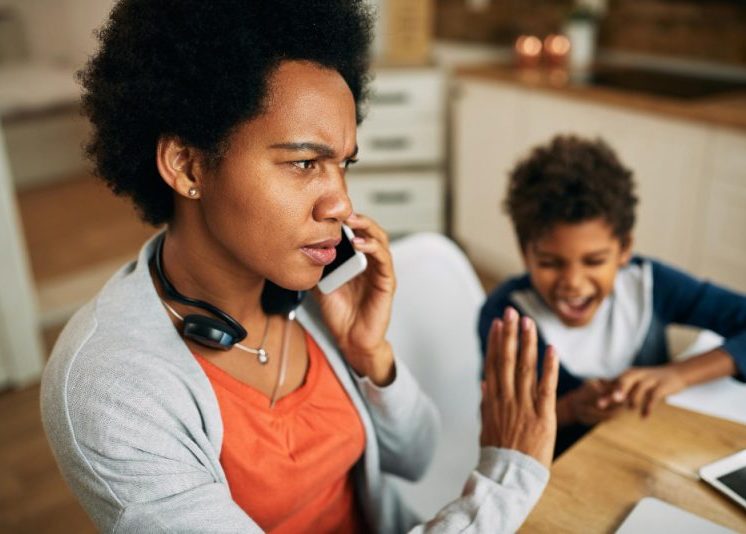7 Conversations Parents Should NOT Be Having in Front of Their Kids

It was a Saturday afternoon, the kind where the Lagos sun was doing its best to turn the living room into a sauna, despite the valiant efforts of the standing fan. Little Femi, all of seven years old and a whirlwind of perpetual motion, was “helping” his mum, Ngozi, sort through a mountain of laundry. Ngozi, meanwhile, was on the phone with her sister, Shade.
“Can you believe Madam Chioma at Chinedu’s school?” Ngozi’s voice was laced with a familiar blend of exasperation and amusement. “She marked his maths paper so low, and when I went to ask her, she was just… dismissive! Said he wasn’t paying attention in class. Honestly, sometimes I wonder if she even knows what she’s doing.”
Femi, who had been meticulously pairing tiny socks, paused, his brow furrowed. Madam Chioma was his favourite teacher. He thought she was very kind and explained things clearly. Now, his mum’s words were planting a seed of doubt, a little cloud over his positive feelings.
Later that evening, as Ngozi and her husband, Emeka, were discussing their finances after a particularly challenging month for Emeka’s business, Femi, seemingly engrossed in his cartoon, suddenly piped up, “Mama, are we going to be poor?”
Ngozi and Emeka exchanged a startled look. They hadn’t realized he was listening, let alone understanding the weight of their worries.
These little moments, so commonplace in the hustle and bustle of family life in Nigeria, highlight a crucial aspect of parenting: the impact of our conversations on our children, even when we think they aren’t paying attention. As parents, especially in our close-knit communities where news and opinions travel fast, it’s important to be mindful of the ‘invisible ears’ around us. Our children absorb far more than we realize, and some conversations, no matter how casual they seem to us, can have a lasting, and sometimes negative, effect.
So, what kind of conversations should we, as parents, strive to keep private? Here are seven types of discussions best had behind closed doors:
- Gossip: Just like Ngozi’s conversation about Madam Chioma, gossiping about neighbours, friends, or even other family members can teach our children to be judgmental and distrustful. In our Nigerian culture where respect for elders and community is often emphasized, it can create a confusing double standard. Instead, let’s model kindness and focus on the positive aspects of people.
- Adult Topics (Sex): Conversations about intimacy are crucial, but they need to be age-appropriate and delivered with sensitivity at the right time. Hearing snippets of adult conversations can lead to confusion, anxiety, and premature understanding. Let these discussions happen when you feel your child is ready and in a private setting.
- Financial Worries and Arguments: As seen with young Femi’s reaction, openly discussing financial struggles or having heated arguments about money can cause significant stress for children. They may internalize these worries and feel insecure about their future. While it’s okay to teach children about the value of money, the heavy burdens should remain between adults.
- Harsh Criticism of Yourself or Your Partner: In the heat of the moment, it’s easy to say things we regret, both about ourselves and our partners. However, constant self-deprecating remarks (“I’m so useless”) or harsh criticism of your spouse can erode a child’s sense of security and teach them negative self-talk and unhealthy relationship patterns. Let’s strive for respectful communication and self-compassion.
- Disparaging Remarks About Family Members: Family dynamics in Nigeria can be complex. However, speaking negatively about grandparents, aunties, uncles, or other relatives in front of your children can create rifts and confusion. Children love their family members, and hearing negative comments can put them in an awkward position and damage family bonds. Address any issues privately with the concerned individual.
- Sensitive Medical or Health Issues: Sharing details of a serious illness or health scare within the family in front of young children can be alarming and cause unnecessary worry. While honesty is important, tailor the information to their age and emotional capacity, preferably in a private conversation designed to reassure rather than frighten.
- “Cringe” or Embarrassing Stories About Them or Others: We all have funny anecdotes, but sharing stories that might embarrass your child or someone else in their presence can be hurtful and erode trust. Imagine Aunty Funke recounting that time little Bola wet the bed at the last family gathering! It might seem funny to the adults, but Bola might feel humiliated. Let’s be mindful of their feelings and maintain their dignity.
Parenting in Nigeria, with its unique social and cultural nuances, requires us to be extra vigilant about the messages we’re sending our children, both through our actions and our words. By being more conscious of the conversations we have around them, we can create a more secure, positive, and emotionally healthy environment for them to thrive. It’s not about hiding everything, but about discerning what is appropriate for their ears and minds, allowing them to grow up feeling safe, secure, and respected.